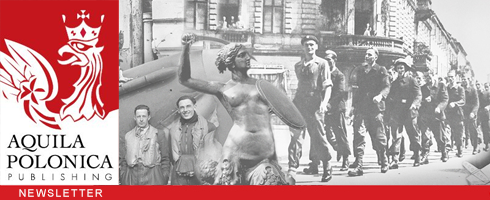May 13, 1901 – Polish Hero Witold Pilecki Born
Polish hero Witold Pilecki was born on May 13, 1901 into a patriotic Polish family in Olonets, a small town in Karelia near the Finnish border, in what was then the Russian Empire (Poland, having been partitioned among Russia, Austria-Hungary and Prussia since 1795, did not regain its independence until the end of World War I in 1918).

From an early age, Pilecki became involved in conspiratorial patriotic Polish organizations, including the Polish scouting movement, preparing for the day when Poland could fight for its freedom. He later fought in the Polish–Bolshevik War of 1919–1920. In 1926, as a member of the Polish military reserve, he was posted to the 26th Uhlan Regiment and promoted reserve second lieutenant in the cavalry.

During the 1920s, Pilecki took over the running of his family’s small estate, and in 1931 he married Maria Ostrowska, a local schoolteacher. They had two children, a son and a daughter. Pilecki was a man of many talents — profoundly patriotic and Catholic, he also wrote poetry, painted and played the guitar.
When World War II broke out, Pilecki fought with the regular Polish army until his unit was disbanded. After that, he became a prominent member of the Polish Underground.
In September 1940, Pilecki volunteered for a secret undercover mission: to get himself arrested and sent to Auschwitz as prisoner, in order to smuggle out intelligence about what was going on there and build a resistance organization among the prisoners.

For nearly three years, Pilecki recorded the horrors he saw in the camp, smuggling reports out to his superiors when he could. His reports were among the first accounts to reach the Western Allies of the German atrocities at Auschwitz, including Hitler’s ‘Final Solution’ for the Jews of Europe — although at the time the Allies thought these reports were exaggerated. Pilecki also succeeded in building a resistance organization among the prisoners in the camp.
Barely surviving nearly three years of starvation, disease and brutality, Pilecki escaped from Auschwitz in April 1943 and made his way back to Warsaw. He fought in the 1944 Warsaw Uprising, was taken prisoner by the Germans, and ended the war in a German POW camp.
After the war ended in 1945, Pilecki volunteered for another undercover mission: this time to return to Poland where conditions were chaotic as the communists were asserting control, to liaise with the anti-communist groups and report back to General Władysław Anders.

He operated undercover in Poland for almost two years, but was captured by the communist authorities in May 1947, tortured, given a “show trial,” and executed on May 25, 1948 as a Western spy and traitor.
 It is only since the fall of communism in 1989 that Pilecki’s story has become known. His most comprehensive report on his Auschwitz mission was published in English for the first time by Aquila Polonica under the title The Auschwitz Volunteer: Beyond Bravery.
It is only since the fall of communism in 1989 that Pilecki’s story has become known. His most comprehensive report on his Auschwitz mission was published in English for the first time by Aquila Polonica under the title The Auschwitz Volunteer: Beyond Bravery.












No comment yet, add your voice below!